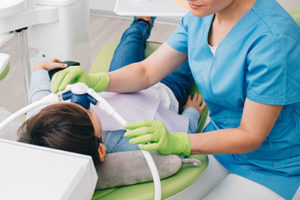Are you considering seeing a Houston sedation dentist? You do not need to suffer from odontophobia to take advantage of our safe and effective sedation dentistry options. Here is everything you need to know about sedation dentistry and the options we offer at Lovett Dental Conroe.
Sedation Dentist Options at Lovett Dental Conroe
People fear lots of things, and many people fear dentists in particular. It is perfectly reasonable to have anxiety about any medical procedure. It is especially normal to fear surgery on such a sensitive area like your mouth. At Lovett Dental Conroe, we want to make you as comfortable as possible. This is why offer a variety of sedation options including:
- Nitrous oxide
- Oral sedation
- IV sedation
- General anesthesia
- Sedation for children
Contrary to popular belief, plenty of patients suffer from dental anxiety. It is not a rare condition, and great dentists take this into consideration when setting up their practices. Patients with generalized anxiety, dentophobia, or any other conditions have access to a range of sedation products and procedures suited to their particular situation.
Sensitivity and Pain

Many people put off going to the dentist because even a routine tooth cleaning or exam hurts their sensitive or damaged teeth. The longer they delay their appointment, the worse the problems become.
Sometimes, patients with sensitivity issues assume a visit to the dentist has to be painful, but that could not be further from the truth. Despite pop culture myths, dentists do not enjoy seeing their patients in pain. They prefer to work with calm, relaxed individuals. This makes it easier for dentists to do their jobs.
Options For Your Dental Needs
You do not need a phobia of dentists or major oral surgery to receive sedation. Whether you have had an accident, deal with sensitive gums, or cannot stop twitching during a routine dental cleaning, there are options available for your unique medical needs. We offer sedation to make patients comfortable during any of our services or procedures, including:
Nitrous Oxide
A common sedative in dentists’ offices around the world, nitrous oxide is better known as “laughing gas.” Dentists often mix this chemical with oxygen for nervous patients or patients undergoing more invasive dental work, such as root canals or tooth removals.
Patients inhale the blended oxygen and nitrous oxide on-site just before any dental work begins. The mixture helps reduce both anxiety and pain, and it is very safe to use. It is non-flammable, and it is only noticeable by the slight metallic flavor it leaves in the mouth.
This treatment has been used for everything from cleanings to surgeries with great success. It involves no needles or pre-appointment prep. Patients who choose nitrous oxide may even be able to drive themselves home. However, laughing gas is no longer the only sedation option patients enjoy.
Oral Sedation
Oral sedation requires patients to take pills orally an hour or two before the procedure depending on the specific medication, dose, etc. Halcion is a common choice, and patients with a strong enough dose may actually fall asleep during their procedure.
Halcion is very similar to Valium. However, patients who take medications for anxiety, depression, sleep disorders, etc. may not be able to take an oral sedative safely. At the very least, the dentist should consult with the patient’s primary care physician to make appropriate arrangements beforehand.
Unlike laughing gas, oral sedation can help reduce anxiety before the patient even sees the dentist, which lowers the effects of odontophobia and generalized anxiety during the lead-up to the procedure. Oral sedation may also be appropriate for anxious children who may panic simply walking into a doctor’s office. You should always consult your pediatric dentistry first.
IV Sedation
In some cases, IV sedation works best for sedation. The doctor has complete control over dosage throughout the procedure. Patients may opt for generalized anesthesia or moderate sedation. Even moderate sedation takes effect very quickly, and many people fall asleep in the chair. Generalized anesthesia requires more preparation and extended recovery time, which may or may not make some types of anxiety worse. It is always best to consult with your primary care physician in advance.
Find a Sedation Dentist
Do not wait for the or nervousness pain to get worse. Call 936-760-2400 today so you can make an appointment with a member of our considerate dental team.
